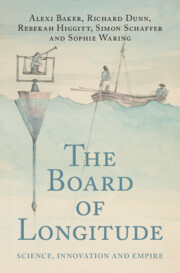Book contents
- The Board of Longitude
- The Board of Longitude
- Copyright page
- Dedication
- Contents
- Figures
- Tables
- Boxes
- Acknowledgements
- Timeline
- Abbreviations
- 1 Introduction
- 2 Sailing the Oceans and Seeking Longitude before 1714
- 3 Launching the Eighteenth-Century Search for Longitude
- 4 The Early Commissioners in Transition
- 5 The Birth of the Board of Longitude
- 6 Time Trials
- 7 Manufacturing the Nautical Almanac
- 8 Managing, Communicating and Judging Longitude after Harrison, 1774–c. 1800
- 9 A Practical Institution Weighed Down by Impractical Proposals?
- 10 What Is an Observatory? From the Metropolis to the Cape
- 11 The Death and Rebirth of the Board of Longitude
- Epilogue
- Book part
- Glossary
- Bibliography
- Index
4 - The Early Commissioners in Transition
Published online by Cambridge University Press: 11 April 2025
- The Board of Longitude
- The Board of Longitude
- Copyright page
- Dedication
- Contents
- Figures
- Tables
- Boxes
- Acknowledgements
- Timeline
- Abbreviations
- 1 Introduction
- 2 Sailing the Oceans and Seeking Longitude before 1714
- 3 Launching the Eighteenth-Century Search for Longitude
- 4 The Early Commissioners in Transition
- 5 The Birth of the Board of Longitude
- 6 Time Trials
- 7 Manufacturing the Nautical Almanac
- 8 Managing, Communicating and Judging Longitude after Harrison, 1774–c. 1800
- 9 A Practical Institution Weighed Down by Impractical Proposals?
- 10 What Is an Observatory? From the Metropolis to the Cape
- 11 The Death and Rebirth of the Board of Longitude
- Epilogue
- Book part
- Glossary
- Bibliography
- Index
Summary
This chapter covers the two decades from the first minuted meeting of the Commissioners of Longitude in 1737. During this time, small groups of Commissioners were called together sporadically for ad hoc meetings, principally to agree funding for specific projectors, notably clockmaker John Harrison and longitude veteran William Whiston. Over this initial period, relations with Harrison were cordial and supportive. Despite these promising developments, it was a period in which public opinion gradually reverted to mockery of those seeking the seemingly impossible longitude dream. The chapter seeks to emphasise in addition the value of looking at some of the schemes that more recent authors have dismissed as invalid. This has occurred not only when proposals seem unlikely to modern eyes but also when their authors were partly or wholly motivated by factors such as religion or financial need, and overlooks the reception of those proposals. The books published by Jane Squire are a particular focus, since they contain some of the best records of the Commissioners’ activities and thoughts during the earlier decades.
- Type
- Chapter
- Information
- The Board of LongitudeScience, Innovation and Empire, pp. 65 - 88Publisher: Cambridge University PressPrint publication year: 2025

